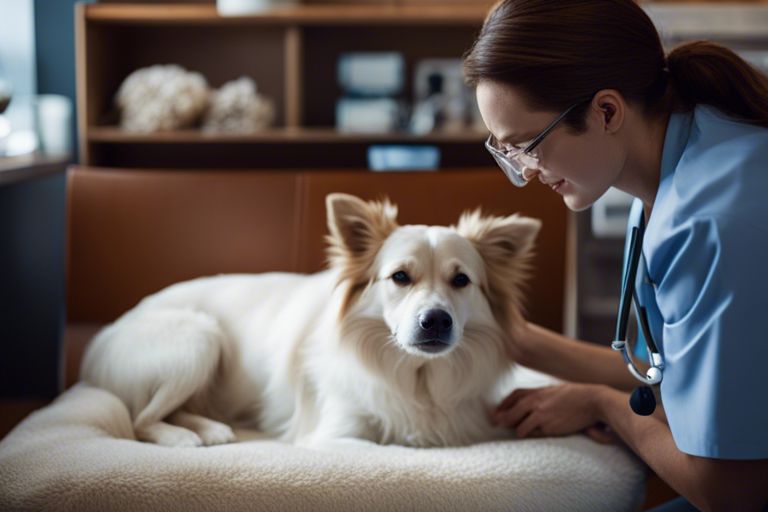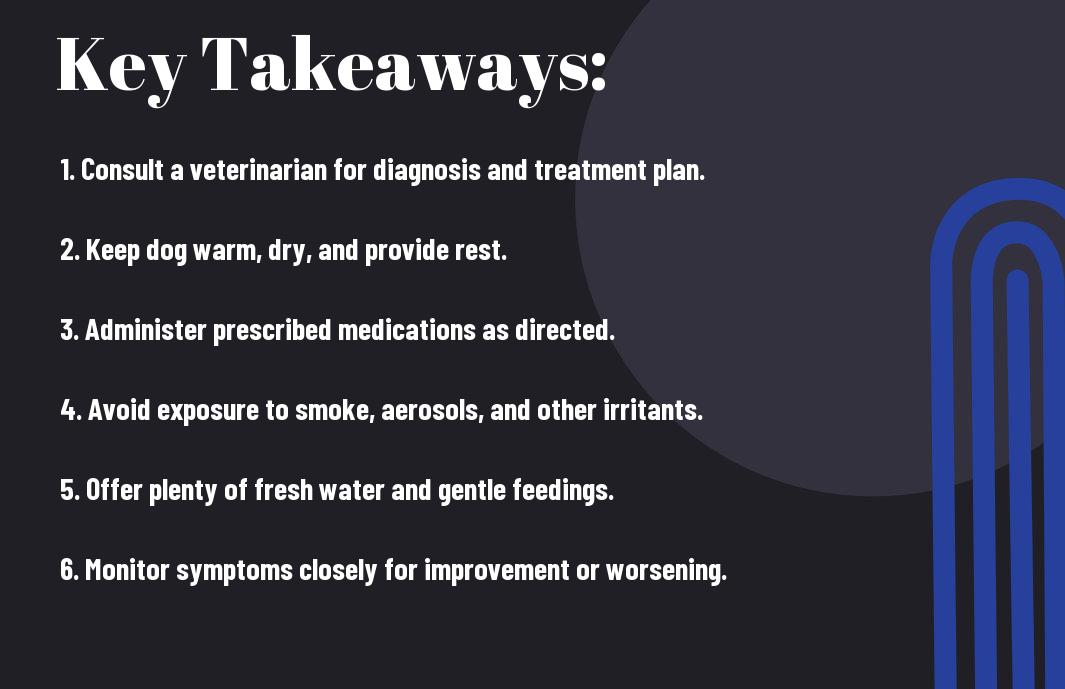There’s a lot you can do to help your furry friend when they are suffering from a respiratory illness. By being attentive to their symptoms and seeking prompt veterinary care, you can ensure the best possible treatment for your dog. From medication to supportive care, understanding how to manage respiratory issues in dogs is crucial for their health and well-being.
Key Takeaways:
- Consult a veterinarian: It is important to seek professional guidance to properly diagnose and treat respiratory illness in dogs.
- Follow treatment plan: Administer medications as prescribed by the veterinarian and follow their recommendations for care and monitoring.
- Provide supportive care: Ensure your dog gets plenty of rest, stays hydrated, and receives proper nutrition to aid in recovery from respiratory illness.
Identifying Respiratory Illness in Dogs
The first step in treating respiratory illness in dogs is to identify the symptoms early on. By recognizing the signs of respiratory issues in your furry friend, you can take prompt action to ensure they receive the necessary care and treatment.
Common Symptoms
Symptoms of respiratory illness in dogs may include coughing, sneezing, difficulty breathing, nasal discharge, wheezing, and lethargy. If you notice any of these signs in your pet, it’s important to consult your veterinarian for a proper diagnosis and treatment plan.
Breeds Prone to Respiratory Issues
Common breeds like pugs, bulldogs, and other brachycephalic breeds are more prone to respiratory issues due to their flat-faced conformation. These breeds often have narrowed airways, making it harder for them to breathe properly.
Identifying respiratory illness in dogs, especially in breeds with known respiratory issues, can help you take the necessary precautions to keep your pet healthy and comfortable. Regular check-ups with your veterinarian and being aware of your dog’s usual behavior and breathing patterns can aid in early detection of any respiratory problems.
Causes of Respiratory Illness in Dogs
Little furry friends can suffer from various respiratory illnesses, which can be caused by a range of factors. Understanding the underlying causes of these conditions is important in determining the best course of treatment for your beloved pet.
Infections
Infections, such as viral, bacterial, or fungal, can lead to respiratory illness in dogs. Common respiratory infections in dogs include kennel cough, pneumonia, and bronchitis. These infections are often contagious and can be transmitted through contact with infected dogs or contaminated surfaces. Symptoms may include coughing, sneezing, nasal discharge, and difficulty breathing.
Allergies
To address allergies, you should consider potential triggers such as pollen, dust, mold, or certain food ingredients. Allergic reactions in dogs can manifest as respiratory issues, causing symptoms like sneezing, coughing, wheezing, and nasal discharge. Identifying and eliminating the allergen from your dog’s environment can help alleviate respiratory distress.
Respiratory illnesses caused by allergies can be chronic or seasonal, depending on the trigger. Seasonal allergies may worsen during specific times of the year, such as spring or fall, while chronic allergies require year-round management.
Environmental Factors
- Poor air quality, exposure to smoke, pollutants, or strong odors
- Extreme temperatures or humidity levels
- Living in crowded or unventilated spaces
Dogs may be more susceptible to respiratory issues when exposed to environmental factors such as poor air quality, smoke, pollutants, or extreme temperatures. Recognizing the impact of these factors on your dog’s respiratory health is crucial in preventing and managing respiratory illnesses.
Diagnostic Tests and Procedures
Now, when your dog is showing symptoms of a respiratory infection, it is crucial to conduct various diagnostic tests and procedures to pinpoint the underlying cause. Before proceeding, refer to an article on Respiratory Infection In Dogs: Symptoms & Management for a comprehensive understanding of the condition.
Physical Examination
Procedures such as a thorough physical examination by your veterinarian are the initial steps in diagnosing respiratory issues in dogs. Your vet will assess your dog’s overall health, listen to their breathing, check for abnormal sounds, and feel for any abnormalities in the chest and throat areas.
Laboratory Tests
Examination of blood samples, throat swabs, and respiratory secretions can provide valuable information about the type of infection present in your dog. These tests can help your vet determine if the infection is bacterial, viral, or fungal in nature, guiding them towards the most effective treatment plan.
Another imperative laboratory test is a complete blood count (CBC) to evaluate your dog’s overall health and detect any inflammation or infection. Additionally, your vet may recommend a culture and sensitivity test to identify the specific bacteria causing the infection and determine the most appropriate antibiotics for treatment.
Imaging Studies
Any unusual findings from physical examination and laboratory tests may prompt your vet to recommend imaging studies such as X-rays or ultrasound to visualize the structures within your dog’s chest. These imaging techniques can reveal abnormalities like pneumonia, masses, or foreign objects that may be causing respiratory symptoms.
Diagnostic tests and procedures play a vital role in accurately diagnosing and treating respiratory illness in your dog. By conducting a series of tests, your vet can create a tailored treatment plan to address your dog’s specific condition and help them breathe easier again.
Treatment Options for Respiratory Illness
Medications
The first line of treatment for respiratory illness in dogs often involves medications. Your veterinarian may prescribe antibiotics if the illness is caused by a bacterial infection. Anti-inflammatory drugs or bronchodilators may also be recommended to help reduce inflammation in the airways and make breathing easier for your pup.
Oxygen Therapy
Options for oxygen therapy can be crucial in severe cases of respiratory illness. If your dog is struggling to breathe, your veterinarian may suggest oxygen therapy to provide the necessary support. This can help increase the oxygen levels in your dog’s blood, making it easier for them to breathe.
For instance, oxygen therapy can be administered through a specialized oxygen cage or a nasal cannula. These methods ensure that your dog receives the right amount of oxygen needed to support their respiratory function.
Nebulization
Any respiratory illness that causes congestion or excessive mucus production may benefit from nebulization. This involves converting liquid medication into a fine mist that can be inhaled by your dog. Nebulization can help open up the airways and ease breathing difficulties.
With the use of a nebulizer machine, you can administer the medication directly into your dog’s airways. This targeted approach ensures that the medication reaches the affected areas, providing relief and promoting faster recovery.
Lifestyle Changes
To support your dog’s recovery from respiratory illness, certain lifestyle changes may be recommended. This can include keeping your dog away from smoke, dust, or other environmental irritants that can worsen their symptoms. In some cases, weight management or adjusting exercise routines may also be advised to prevent breathing difficulties.
Medications, oxygen therapy, nebulization, and lifestyle changes all play an necessary role in treating respiratory illness in dogs. By working closely with your veterinarian and following their recommendations, you can help alleviate your dog’s symptoms and improve their quality of life.
Managing Chronic Respiratory Conditions
Not all respiratory conditions in dogs can be completely cured, but with proper management, you can help your furry friend live a comfortable and fulfilling life. Here are some key aspects to focus on when managing chronic respiratory conditions.
Creating a Healthy Environment
For creating a healthy environment for your dog with a chronic respiratory condition, it’s necessary to reduce potential triggers and irritants in your home. Keep your living spaces well-ventilated and free from smoke, strong scents, dust, and other airborne particles that could exacerbate your dog’s condition. Consider using an air purifier to improve air quality, especially during allergy seasons.
Dietary Changes
For dietary changes to support your dog with a chronic respiratory condition, consult with your veterinarian to determine the best course of action. They may recommend a diet rich in omega-3 fatty acids, which have anti-inflammatory properties and can help reduce respiratory inflammation in your canine companion.
Chronic respiratory conditions can sometimes be linked to obesity, so monitoring your dog’s weight and providing a well-balanced diet is crucial. Additionally, ensuring your dog has access to fresh water at all times is necessary to keep their respiratory tract hydrated and functioning optimally.
Exercise and Activity Management
On the topic of exercise and activity management for dogs with chronic respiratory conditions, it’s important to tailor their physical activities to their individual needs. Avoid strenuous exercise in extreme weather conditions, as temperature fluctuations can trigger respiratory distress. Short, gentle walks and low-impact activities can help maintain your dog’s overall health without putting too much strain on their respiratory system.
Understanding your dog’s limitations and observing their breathing patterns during exercise can help you gauge the appropriate level of activity. Regular, moderate exercise can help strengthen your dog’s respiratory muscles and improve their lung capacity over time.
Preventing Respiratory Illness in Dogs
Vaccinations and Preventatives
To prevent respiratory illnesses in your dog, vaccinations are key. Make sure your dog is up to date on all necessary vaccinations, including those that protect against canine influenza, kennel cough, and other respiratory diseases. Your veterinarian can recommend a vaccination schedule based on your dog’s individual needs and lifestyle. Additionally, using preventatives such as flea and tick medications can help reduce the risk of certain respiratory infections.
Regular Check-Ups
With regular check-ups, your veterinarian can monitor your dog’s overall health and catch any potential respiratory issues early on. During these visits, your vet may listen to your dog’s lungs, check for any signs of respiratory distress, and provide advice on how to best prevent respiratory illnesses. Regular check-ups also allow for timely vaccination updates and screenings for underlying conditions that could impact your dog’s respiratory health.
Regular check-ups are necessary for maintaining your dog’s respiratory health. Your veterinarian can provide personalized recommendations on nutrition, exercise, and preventative care based on your dog’s breed, age, and overall health status. By staying proactive with these check-ups, you can help ensure your dog leads a healthy and happy life.
Maintaining a Healthy Weight
Understanding the importance of maintaining a healthy weight for your dog is crucial in preventing respiratory issues. Excess weight can put strain on your dog’s respiratory system, making it harder for them to breathe properly and increasing the risk of respiratory illnesses. Be mindful of your dog’s diet and exercise routine to help them stay at a healthy weight.
Weight management plays a significant role in your dog’s overall well-being. Consult with your veterinarian to determine the ideal weight for your dog based on their breed and size. By providing proper nutrition and regular exercise, you can help prevent respiratory problems associated with obesity.
Preventing
By following these preventive measures, you can significantly reduce the risk of respiratory illnesses in your dog. Vaccinations, regular check-ups, weight management, and other preventative strategies can all contribute to maintaining your dog’s respiratory health and overall quality of life. Stay proactive in caring for your furry companion to ensure they stay happy and healthy for years to come.
Summing up
Upon reflecting on how to treat respiratory illness in dogs, it is important to remember that early detection and prompt treatment are key to a successful recovery. By monitoring your dog’s symptoms closely, consulting with a veterinarian, and following their recommendations for medications and therapies, you can help your furry friend get back to their healthy and happy self.
Keep in mind, every dog is unique, and what works for one may not work for another. Patience, love, and attention to detail will be your best allies in helping your canine companion through any respiratory illness they may face. By being proactive and responsive to their needs, you can ensure that your dog receives the best care possible. Stay informed, stay observant, and most importantly, stay compassionate towards your furry friend.
FAQ
Q: What are the common signs of respiratory illness in dogs?
A: Common signs of respiratory illness in dogs include coughing, sneezing, wheezing, difficulty breathing, nasal discharge, and lethargy.
Q: How is respiratory illness diagnosed in dogs?
A: Respiratory illness in dogs can be diagnosed through a physical examination, x-rays, blood tests, and sometimes more specialized tests like bronchoscopy or CT scans.
Q: What are the treatment options for respiratory illness in dogs?
A: Treatment for respiratory illness in dogs may include medications such as antibiotics, cough suppressants, bronchodilators, and sometimes steroids. In severe cases, oxygen therapy or surgery may be necessary.
Q: How can I help prevent respiratory illness in my dog?
A: To help prevent respiratory illness in your dog, make sure they are up to date on vaccinations, avoid exposure to smoke or pollutants, maintain a healthy weight, and provide regular exercise.
Q: When should I seek veterinary care for my dog’s respiratory symptoms?
A: It is important to seek veterinary care if your dog is experiencing persistent or severe respiratory symptoms, as untreated respiratory illness can lead to serious complications. Contact your veterinarian if you notice any concerning signs or symptoms in your dog.
Are strawberries toxic for dogs
Your Dog’s Allergies: Expert Advice
Demystifying Anal Gland Issues in Dogs: Your Comprehensive Guide from the American Kennel Club




